
Debuting at the tender age of 18 in the darkly disturbing THE WORLD OF KANAKO, KOMATSU Nana made it clear she was serious about her transition from teen supermodel to actress. An impressive array of films, including director Martin Scorseseís SILENCE, saw quickly her becoming one of Japanís most sought-after actresses.
At the New York Asian Film Festival to receive their Rising Star award, KOMATSU chatted exclusively with LMD about her latest film, SAMURAI MARATHON, action star aspirations, and portraying strong women to women.
Dig it!
SAMURAI MARATHON
KOMATSU Nana
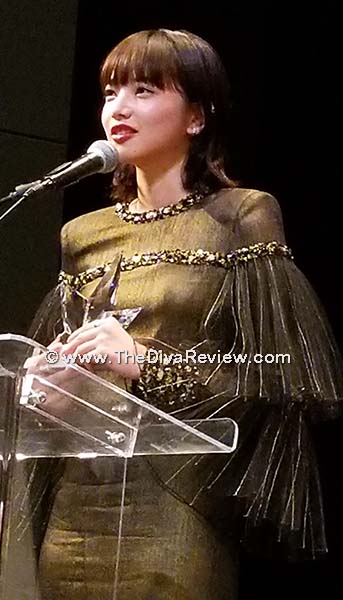
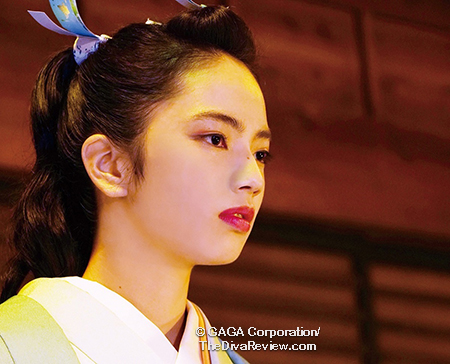 The
Lady Miz Diva: What attracted you to the role of Yukihime, the princess
of the film?
The
Lady Miz Diva: What attracted you to the role of Yukihime, the princess
of the film?
KOMATSU Nana: So, I had to audition for this role. When I first read the script, in that kind of period, it was a society where women would do the housework, and men were the strong ones, and women had to cater to men; but in that environment, Yukihime, she does what she likes.
She pursues her interest in western things, and she sticks to that. She pursues her interest in the world with great curiosity, which was something that I really related to. So through this role, I hoped that I could portray strong woman to women worldwide.
LMD: Yukihimeís father clearly loves her; she has been taught to fight, she has been taught to paint -- he indulges her. However, thereís that moment early on, when he takes her painting of the black ships and burns it, then brings in the man sheís being forced to marry. It seems like his burning the picture was symbolic of her dreams being burned, and all his encouragement was a lie.
The expression on your face at that moment is so powerful; tell us about that scene?
KN: Initially, there actually was dialogue in that scene. There were words to communicate what was going on with her, but as I was trying it -- as I was approaching it -- I felt that words somehow weakened her strength, weakened the communication of what she was going through. So, I communicated that with the director, Bernard Rose, and he said, ďYouíre playing this role. If thatís what you want to try, do it.Ē So, in trying it, I still wanted feedback as to whether it worked or not, but I just felt that.
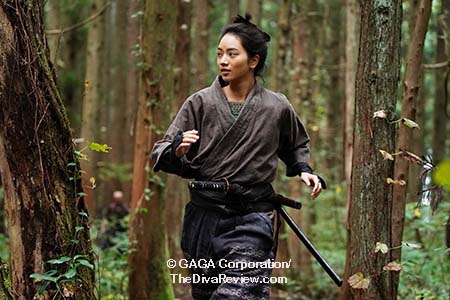 LMD:
You have a lot of action in this film, including so much running, as one
would expect from the title. You also get to have some fight scenes.
Tell us about the physical challenges of the role?
LMD:
You have a lot of action in this film, including so much running, as one
would expect from the title. You also get to have some fight scenes.
Tell us about the physical challenges of the role?
KN: So, it was actually my first time doing fight choreography, as well as horseback riding, but I really loved it. I tried horseback riding with my family as a kid, and I also love animals, so, having the opportunity to try these things was great. We started practicing about one month before filming, to do the horse riding, as well as the fighting.
There were certainly some challenges in how to present it for the camera. And for me, when I was playing Yukihime in her kimono, I wanted to be elegant, almost dancelike with the fighting, but when it was her in disguise as Kumanosuke, I wanted to be powerful and strong; kind of a bigger, manly fighting style. So, I discussed that with the fight director, and I also tried to keep it in mind as we were filming.
I really enjoyed it, and would love to do more, and continue to do it. Also, thereís a lot of films overseas, as well, that deal with this period, so I think thereís a lot of opportunity there, as well.
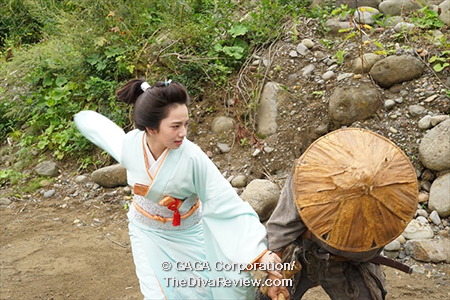 LMD:
Your first film, THE WORLD OF KANAKO, is a very disturbing film, and
your character was quite dark. You played a wild character in KURU {IT
COMES}. Yukihime in SAMURAI MARATHON is also unusual, as while
she is very much a noble lady, she doesnít hesitate to cut her hair,
dress up like a man, and run across the country, fighting and stabbing
people.
LMD:
Your first film, THE WORLD OF KANAKO, is a very disturbing film, and
your character was quite dark. You played a wild character in KURU {IT
COMES}. Yukihime in SAMURAI MARATHON is also unusual, as while
she is very much a noble lady, she doesnít hesitate to cut her hair,
dress up like a man, and run across the country, fighting and stabbing
people.
Are you drawn to unorthodox characters? Do you ever hesitate about playing someone too crazy or dark because of the effect it might have on your fans, or your other work as a model?
KN: With my first role in THE WORLD OF KANAKO, actually, the image of being kind of darker and cool kind of stuck with me, initially, after doing that role, I thought. But afterwards, I got to do more kind of pure, maybe expressionless, but with lots of feeling, sometimes awkward, cute, varied kinds of roles. So, Iíve been lucky to do all these kinds of roles, and I havenít been bored. If I didnít do this acting for living, and did something thatís more stable, such as working in an office, I donít think would be for me. I would get bored.
So, in doing all these different kinds of roles, I get to try horse riding, if itís a music movie, I get to try to learn guitar; so, it also expands my hobbies and interests. So, I really feel blessed in doing all this work. I feel really alive through the acting that I do. And, for me, Iíd like to participate in lots of different works, and have people have a lot of different impressions of who I am. I think thatís the kind of person I want to be, and thatís interesting to me.
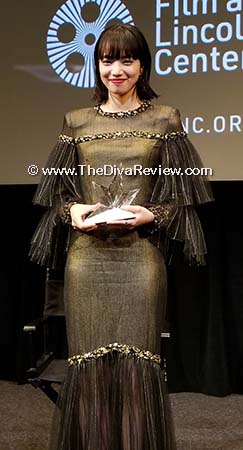 LMD:
You have worked with some great filmmakers in a very short time: THE
WORLD OF KANAKO was directed by Nakashima Tetsuya. You were
selected by Martin Scorsese for SILENCE. You were directed by One
Hitoshi in BAKUMAN. Now, youíve worked with Bernard Rose on this film.
After what you said about inspiring that scene in SAMURAI MARATHON, Iím
curious whether you have considered expanding your talents to making
films, as well?
LMD:
You have worked with some great filmmakers in a very short time: THE
WORLD OF KANAKO was directed by Nakashima Tetsuya. You were
selected by Martin Scorsese for SILENCE. You were directed by One
Hitoshi in BAKUMAN. Now, youíve worked with Bernard Rose on this film.
After what you said about inspiring that scene in SAMURAI MARATHON, Iím
curious whether you have considered expanding your talents to making
films, as well?
KN: I think, in Japan, there have been more actors going behind the camera with writing or directing. I think for an actor to be directing, I think they have a different way of looking at things, and a different way of showing things from their background in acting. But, as of now, Iím personally not interested, but I like seeing it, so I like actors that Iíve worked with directing or writing. Thatís exciting to me, but for me, right now, itís a little bit different. But as more young people create these different kinds of works, I think it is a very exciting, fun time in film. I think new things are being birthed in terms of genres and different types of expressions, so as a film lover, Iím very happy about it.
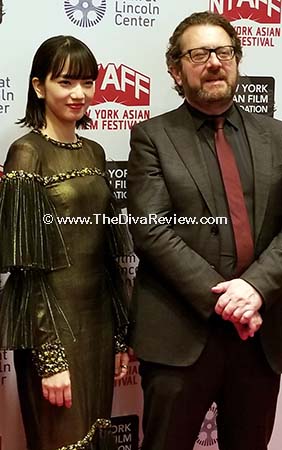 LMD:
Please tell us about being directed by Bernard Rose on SAMURAI
MARATHON. He is an unusual choice to direct a jidaigeki film based on
Japanese history. Youíve worked with a western director in Japan
before, but this a Japanese story, more in the style of a Japanese film,
in Japanese language. What was it like to make a historical film with a
western director?
LMD:
Please tell us about being directed by Bernard Rose on SAMURAI
MARATHON. He is an unusual choice to direct a jidaigeki film based on
Japanese history. Youíve worked with a western director in Japan
before, but this a Japanese story, more in the style of a Japanese film,
in Japanese language. What was it like to make a historical film with a
western director?
KN: I think itís very exciting for this new energy to be coming into jidaigeki, or Japanese period pieces. Watching the film, I really felt like it was a melding of a really western kind of aesthetic, as well as the beauty and the gorgeous parts of old Japan. I think the perspective as someone outside of Japan, what they find beautiful in Japan, is maybe a little different, but I think that is captured really well; the beauty of the countryside from Western perspective.
At the same time, Director Rose was really passionate and really felt the soul of the samurai, and he seemed so happy making the film. Also, for someone like him to have come on his own -- literally everyone else on the set was Japanese, he was the one foreigner on the set, basically -- to witness that was really interesting. To have also witnessed him struggling with the Japanese ways, and fighting against that, and trying to work within that, and to be like, ďNo, that doesnít matter. I want to do it this way.Ē To have stuck to his guns, to witness him passionately commit and fight for his vision was really invigorating for me, and made me really want to deliver, as well. Of course, there were different challenges with horseback riding, and such, but I think the passion of the director really kind of energised all of us, which led us to being able to do the film.
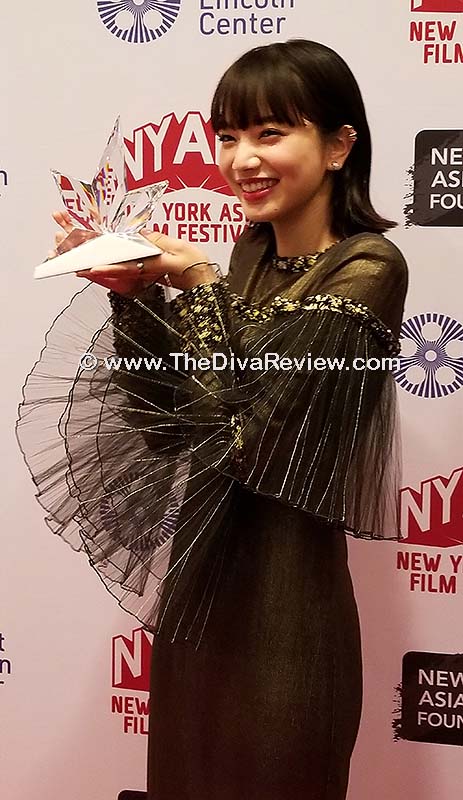 LMD:
Has this experience working with Director Rose, and your previous
collaboration with Martin Scorsese made you want to try working with
filmmakers in the west?
LMD:
Has this experience working with Director Rose, and your previous
collaboration with Martin Scorsese made you want to try working with
filmmakers in the west?
KN: I would love to, if there were any opportunities while Iím young, but also, even if Iím not young, to kind of break out. Japanese films made in Japan have their own beauty; they are wonderful, but working with these different directors, I find really inspiring.
There are new kinds of discoveries, and also, being in an environment where everything is in English, of course, doesnít happen on Japanese sets. It wasnít that I understood everything, but it felt really fun for me. I really enjoyed it.
Also, I experienced the energy of the Western artist; I got the sense that they were all having fun. There was a sense of I donít know whatís going to happen next, but itís fun, and they seemed happy, so that made me happy, and it was fun for me. I learned from that; that I can enjoy everything more. And beyond working with these different artists, I would love to communicate more and talk more with crew members on the sets, and hear lots of different stories, and get advice on how I can grow.
~ The Lady Miz Diva
June 28th, 2019
© 2006-2022 The Diva Review.com
|
|































